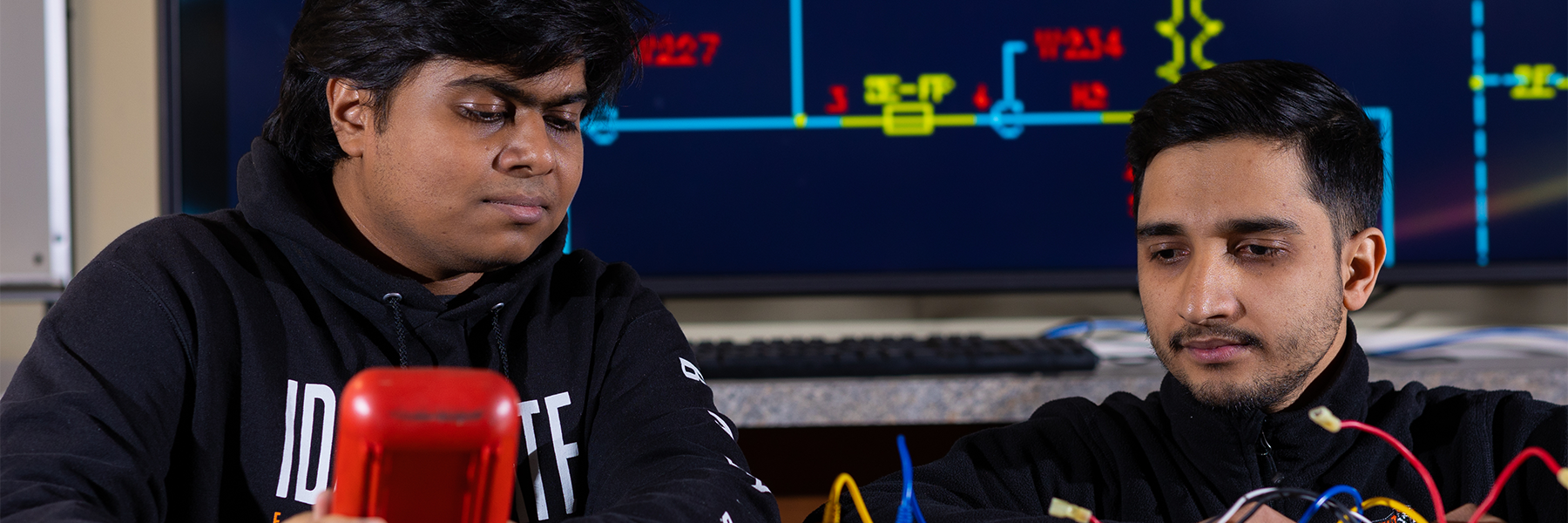Electrical and Computer Engineering

Idaho LAUNCH
Idaho LAUNCH grants provide graduating high school seniors with an opportunity to have up to 80% of their tuition and fees covered, up to $8,000, for programs leading to in-demand careers, including Electrical and Computer Engineering. Additionally, students who receive Idaho LAUNCH grants have the option to combine them with other scholarships offered by Idaho State University.
Welcome to Idaho State Electrical and Computer Engineering
The Idaho State University Department of Electrical and Computer Engineering prepares students for various careers in machine learning, computer hardware development, microelectronics, power grids, and more.
We offer a Bachelor of Science (BS) and a Master of Science (MS) in both Electrical Engineering and Computer Engineering and a doctoral degree in Engineering and Applied Science. Our bachelor's degree provides a strong foundation to start a career in fields ranging from electronics to energy systems, semiconductors, and more. Meanwhile, the master’s degree prepares students to work in research and development roles, either in academia or industry. Lastly, our doctorate allows students to pursue their own questions and research into topics related to electrical and computer engineering.
Students can get hands-on and paid research experience in a laboratory setting with on-campus and off-campus employers once they have completed a few introductory courses through the Career Path Internship (CPI) program.
Our Pocatello campus is nestled in the foothills of the Rocky Mountains, and students have ample opportunities for hiking, mountain biking, skiing, snowboarding, and more. Yellowstone and Grand Teton National Parks are just a short drive away.
From cell phones to automobiles, appliances, next-gen networks, and more, the work of electrical and computer engineers touches every part of modern life, and we encourage you to schedule a visit with the Department of Electrical and Computer Engineering to learn more about the program.
Research Areas
6G Networks
6G networks are the next-generation communication systems expected to offer even faster data speeds, lower latency, and advanced capabilities beyond 5G.
Communications
Communications encompasses the transmission and reception of information between individuals or devices, enabling data exchange through various means, such as speaking, writing, or digital technologies like the Internet.
Computer Hardware
Computer hardware refers to the physical components that make up a computer system, such as the central processing unit (CPU), memory, storage devices, peripherals, etc.
Control Engineering
Control engineering designs systems and algorithms that regulate and manage the behavior of machines and processes, ensuring they perform as intended.
Cyber-Physical Systems
Cyber-physical systems integrate digital technology with the physical world, often found in autonomous vehicles and smart infrastructure.
Embedded Systems
Embedded systems are specialized computers integrated into devices and machines to control their functions, often unseen by users, like the software in a car's engine control unit.
Implantable Antennas
Implantable antennas are tiny devices placed inside the human body to facilitate wireless communication with medical implants, like pacemakers or insulin pumps.
Internet of Things (IoT)
The Internet of Things (IoT) connects devices to the internet, enabling them to communicate and share data. This interconnectivity enhances automation, efficiency, and real-time insights across various applications and industries.
Machine Learning
Machine Learning is a subset of AI where computers learn from data and experiences to improve their performance on specific tasks, such as predicting weather patterns.
Microelectronics
Microelectronics focuses on the design and manufacture of very small electronic components and circuits, essential for the operation of modern electronics like smartphones and computers.
Millimeter Wave Antennas
Millimeter wave antennas use high-frequency waves to enable ultra-fast wireless data transfer, crucial for technologies like 5G and beyond.
Power Grid and Systems
Power Grid and Systems manage electricity distribution, ensuring reliable supply. It includes networks, substations, and control systems, vital for efficient and stable electrical supply to homes, businesses, and industries.
Semiconductor Processing
Semiconductor processing involves manufacturing electronic components on silicon wafers. This precise and intricate process creates microchips and integrated circuits essential for modern electronics.
